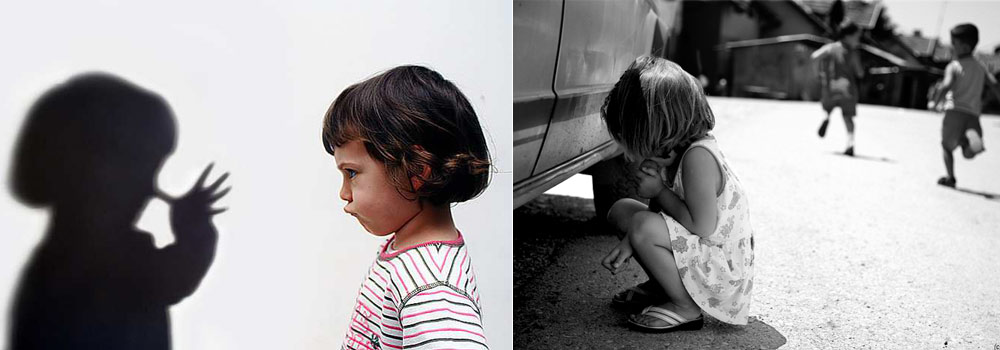Our children are our joy. So I want every day for a child with happiness and discovery. But we notice some shyness, and then a strong shy - the child runs away when guests come, lowered his head, when you just need to say hello, it is afraid that it will be called to the board or entrusted to speak from the scene on the matinee. And we understand that the child is shy for other children, adults, in general, all other people's people. What to do with this problem? How to help him overcome shyness, how to teach a child not to be shy?
● Why is the child shy? What is the reason for excessive shuffle? Where does the shyness come from early and school age?
● What to do with shyness? How to teach a child do not be shy?
● Is it possible to overcome the impact of the child and how to do it?
So good when the child is not shy. Here is the neighbors, what baby: from early age only guests in the house, he is already climbing the chair and reads poems or sings songs. There is no shock and in mom. And on the street - all the children greet, smile, talk. Yes, and at school - learned a lesson or not very, and the child goes to the board, tells him and it is not necessary for him that can somewhere ridiculously and ineptly.
And here is such a grief: our smart baby, such a curious, knows long poems by heart, and there are so difficult that the neighbor and not dreamed. He is so beautiful that it can easily appear on the stage. But guests come, and the child begins to be shy, clogged into the farthest corner, afraid to go out and just say hello, not to mention to tell the poem. Further more, when moving to school, the constraint not only does not go away, but increases.
And most importantly, it is impossible to bring it out of this state. The child is shy to tears and no persuasion, pushing, even threats or punishment, do not help him. He hides behind the mother's skirt or under the table, does not want to leave his room, puzzled and lowers his eyes to the floor. When did it start? The child began to shy in 3-4 years or already at school? In fact, age is not important, in childhood any problem can be removed, you just need to know how.
Why is the child shy? - The answer should be sought in a visual vector
In order to understand the root causes of children's shock, it is necessary to know psychology at least a little bit. All our desires are congenital and are given from nature. System-vector psychology divides them by vectors. One of the vectors - the visual has a whole set of desires, which are expressed in certain features, they are very easy to learn in a very small age.

And emotional openness, as well as shyness - this is just two manifestations that lie in the roots of the visual vector.
Fear is what the visitor can swing, increasing it. When, in response to emotional openness, a visual child hears laughter, calling him, he is hit, he has fear instead of emotional communications. The child begins to swing not on empathy, which would be good for him, but at fear, with the result that fear increases at times. This is the shower of a child - fear show yourself, to open peace, love and be loved.
So it turns out that children with a visual vector, the most potentially trained, the most intelligent, the most kind and cleared of nature, become closed sociophobes. Having hit, having experienced fear, the visitor ceases to open, but only closes even more.
From the side, it seems that most children are not shy. In fact, it is not. Most children simply do not have a visual vector - they have neither fear or emotional openness. So, they simply show their desires outside the way they want.
If the child is shy in kindergarten or school, this is a signal that somewhere there was an injury of a visual vector - the child closed to show himself. The reasons may be a lot: in response to openness and emotionality, someone laughed at him, said the rude word, joked, called. As a rule, everything comes from other children - "good" peers will always find something to clutch. The child does not argue "P" or whispel, it will be opposed. The child fell and stained, now he will constantly shout that he is "krivolap". The child suffers overweight and receives the nickname "Zhirttrest." In general, external beauty is very important for the spectator and if it is being treated, they say that he does not beautifully open his mouth when he says or eats that he has a ugly facial expression, when he declares poems, it introduces it to the state of fear to show him further , reveal.
Not only peers can introduce a visual child into a state of shy. There can also be from native brothers or sisters, from adolescents, from adults, even from their own parents. "Oh, well, you and clown with us, Sasha, when you fall, you can get hot," a ha ha, look at the daughter, how she dances, no cow compare ", etc. - When we laugh at the cute attempts of the child to express themselves, they often do not even notice that we are hanging on the neck of the stone of shy.
When I was completely baby, I was presented with gramophone. In my childhood there were no computers and music centers with CDs, and the gramophone was a real treasure. Mom bought me a new record every week with fairy tales and poems, which then went out like magazines now. Do not know how to read, I am unsuced to listen to other people's voices for many times, scrolling the record again and again. And I opened the ability - just a few days later I knew all the text, moreover, I repeated it with the intonations of actors, imitating them. Of course, probably, it turned out simply enough, but the parents literally shocked my talent, they could not believe that I could. And I gladly told the parents in the kitchen, what I learned. One day, mom on a walk with me asked to tell the record for a familiar aunt, who also walked with her children. I began to tell, but the eldest son of the aunt began to laugh at me: "Che, what, I didn't understand! Haha! Mom, but what does she not tell the letter" r "?" He shouted to the whole street. Aunt supported her child , I said that I have no talent, and it would be better for me to spend the speech therapist, instead of people to show themselves. They laughed at me, and I didn't continue to tell. And then there were constant hikes to the speech therapists - Mom led me to Doctors who only said that the girl has a big problem.
"P" I learned how to pronounce only in the 7th grade, but until the end of the 11th "poisoned" classmates for my whisper. Today I understand that this is exactly what has become a great trauma of my visual vector.
Strong injury of the visual vector in a child can occur from communicating with a man with an oral vector. It is orals that are invented and "glued" offensive nicknames, which then accompany the child to the end of a kindergarten or school, they laugh and their laughter is very infectious, he repeat the rest of the children and now the whole crowd is laughing. And often sprouts to the victims choose exactly viewers. So the nature is arranged and fighting with the consequences of such an influence of the sputter on the spectator should not be reenformed, but development, the formation of the visual vector of his child.
And then the rule works - which is afraid, it will certainly happen. The more "Krivolap" clicure, the more you fall, the more laugh, and so in a circle. The situation is terrible, but what to do if the child is shy and is only enhanced. The answer is one - to beat the alarm! But attention (!) This does not mean that it is necessary to run to school and protect the visual kid from ridicule. It most likely will not give anything, but only aggravate the situation - it will be even more laughing at him. It is necessary to act differently - through the visual vector and its innate desires.
Normally, the auditorium as the child grows should be transformed into the opposite property, to push out - turn into kindness, compassion, the ability to sympathize. Peace openness gradually turns into empathy, a subtle feeling of the emotions of another person. Only developed visual people can be talented actors, beautiful writers, excellent doctors. Moreover, it is communication with other people, love is real happiness, joy for a visitor, the highest filling of his vector.
And if the child is shy, the parents are taking a signal - the visual vector does not develop, and it may not go to these states before Pubertat, and it means that the villager will experience fears, suffer with shy, will not be able to communicate normally with others.

The task of the parents of a visual child to help him overcome fears, become emotionally open. And then the rapidness of the child will go away by itself. How to do it? Only not violent "Wedge Wedge" - you are afraid to go to the scene, we pull you out. You are afraid to go to the board and respond to the lesson, we ask the teacher to call you more often. You are afraid to communicate with peers, we will ask them to come to visit every evening. It will not give anything, but only more will strengthen the fears of the child.
The visual fears do not go out when they overcome them forcibly. So they only enhance, increasingly driven into a person in the heart. You can get rid of fear, you can only pushing it out - transforming from fear for yourself in the fear of "for others", that is, in compassion.
It is also not necessary to emphasize the attention of the child on his shyness, do not be afraid of adults and children. It is necessary to gradually show him that there are many others around him who need his sympathy, fear for them. Gently spend it through all the stages of the development of the visual vector: from plants to animals, from animals to people (read a small example of how to do it. Show the child that others also hurt, and only he, with his kindness, can help them. Fear for yourself And fear for another - these are incompatible things in one visual man. Having learned to be afraid of others, sympathize, he will never be able to swing at fear for himself, and this means that it does not threatens with impactivity, neither psychosomatic diseases or sociophobia.
Attention! This article is informational in nature, it is impossible to accurately determine the vector set of a child. If you have a desire to truly understand your child, you need to go through a full course of training on system-vector thinking. Sign up for introductory, free lectures.

Already thousands of people have been training in the system-vector psychology of Yuri Burlan. They had a relationship with loved ones, a negative state was held, the educational process of children was completely transformed.